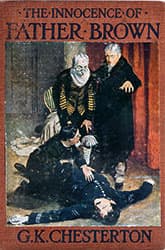The Innocence of Father Brown
Critique • Quotes • Text • Father Brown at the movies
 First edition
First editionFirst publication
1911
Literature form
Story collection
Genres
Crime, mystery
Writing language
English
Author's country
England
Length
approx. 87,000 words

Father Brown (Kenneth More, left) considers the crime in "The Hammer of God" episode of 1974.
The faithful detective
Father Brown (1974): Television series, 13 episodes, 49–51 minutes each; directors Robert Tonson (6 episodes), Peter Jeffries (6), Ian Fordyce; writers Hugh Leonard (7), Peter Wildeblood (3), Michael Voysey (2), John Portman; featuring Kenneth More, Dennis Burgess
The 1974 series shows what you get when the Father Brown stories are faithfully—you could say rigidly—adapted. The results are both enchanting and a slight letdown.
The thirteen episodes made for British television are taken from across G.K. Chesterton's story oeuvre, in various locations with the only constant figure being the priest, impersonated by popular English actor Kenneth More (The 39 Steps).
An occasionally appearing character is Father Brown's friend Flambeau, the reformed thief who has become a private investigator. Played by Welsh actor Dennis Burgess, his role seems to be to act as Doctor Watson to Brown's Sherlock Holmes.
The episodes of less than an hour follow the short stories closely, even adopting much of the dialogue, including—delightfully—many of the priest's paradoxical aphorisms.
Minor changes are sometimes made to the plots only to get Father Brown into each case, as the priest just pops up in random locations in the original stories. For example, in the opening episode based on "The Hammer of God", instead of Father Brown being a priest in the village where the murder occurs, he is just visiting. Otherwise the episode follows the Chesterton narrative almost exactly, sometimes word for word.
Little plays
The Father Brown stories have been called the first cozy mysteries—each one occurring among a small community of suspects—and the episodes in this series reflect the stories' static nature. Scenes for each show seem to take place on two or three related sets, with little action and with lots of stagey dialogue designed to quickly bring out character traits. Each episode is produced like a little play.
But, as dull as this sounds, it works well. Partly because the dialogue is from Chesterton and thereby usually entertaining, and partly because the theatrically trained British casts—changing in each episode—are all wonderful character actors.
Kenneth More is a surprisingly good Father Brown. He's affable and difficult by turns as he needs to be to solve the crimes—and more importantly to dispense a more human (though he might say divine) justice. He's a modest figure who is easily overlooked at first. If I have any complaint about More's portrayal it's that his Father Brown sometimes appears a little too bumbling, though he eventually wins the regard of anyone who comes up against him.
Hewing so closely to the original stories, however, comes with its risks. For one thing, endings often seem cast adrift. Chesterton's stories often conclude abruptly once his point's been made. This series similaarly has no problem with episodes cutting to the credits without the culprit being arrested or any other dramatic resolution, once Father Brown has reached his own conclusions. One is sometimes left with a feeling of having missed the climax.
But eventually you realize all the truly significant elements of the story have been experienced and the finishing touches are indicated without being belaboured. This essentialism becomes part of the charm of the Father Brown series.
— Eric
Critique • Quotes • Text • Father Brown at the movies
1934, 1974, 2013–present

